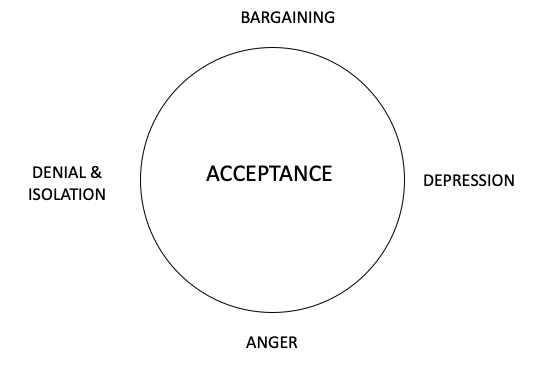
By Janneke Koole
When life asks us to let go of someone or something we hold as precious, someone or something we cannot imagine living without, we grieve the loss. Grieving is an essential process of letting go.
The bigger the loss, the more intense the grief. And grief is messy – it simply does its own thing and there is little we can do to “stop it” or mold it into something that fits what we consider “proper” behavior. Grief is a powerful wave of LOVE, that moves us through several waves of healing, letting go, and getting back into the flow of Life. For Life keeps going no matter what we feel, do, think, or are going through. Ultimately, grief carries us to the re-birthing and re-building of our life.
Grief is like the ocean – it comes on waves,
Ebbing and flowing.
All we can do is learn to Swim
By Vicki Harrison
Elizabeth Kubler-Ross is the pioneer on Death and Dying. She identified five stages of grief – not to be understood as sequential steps but aspects of the process that grief goes through. Not everyone goes through each of the stages and no one does them the same way. Each person goes through grief in their own unique timing and ways.
I chose to put these five stages on a wheel just to be sure we would not think of them as a linear process.

Let’s take a closer look at each one.
ANGER (south)
Anger is often a very strong expression – sometimes covering the deeper feelings of guilt, blame, shame, and love! Grief is like huge waves of emotions, pure energy in motion, that stops for nothing or no one when it comes flooding in – and along with this wave of grief comes anger. Sometimes, the very power of our grief is enough to become angry. Many times, we are angry at ourselves – even as we express the anger towards someone else. It is essential to provide a safe place for this catharsis – for anger can purge the soul.
When I volunteered as an art therapist at Bereaved Families of Ontario, one of the young boys taught me this in a most profound manner. He had been playing with his younger brother on the sidewalk when a terrible accident happened and his brother was killed. He came to our group an angry, sullen, and withdrawn little boy. After some time, he began working with the tray of wet clay. Silently, he would take some of that clay and smash it back into the tray. One day, this process intensified and he let it all out, concluding with a profoundly calm and simple creation out of the smashed wet clay. He looked up at me and smiled, “I’m done now.” We both had tears as we hugged and he went on his way with a lighter heart and the beginnings of integrating back into Life.
BARGAINING (north)
This can begin before an impending loss – and continue as a way to deal with it once it has occurred. It sounds like, “Please God….” Or “I will never do…. If only …” or “What if….then I would….” These inner dialogues, incessant story-telling, or fist-pounding prayers are often founded in regrets about life not lived, important matters of the heart not spoken, actions unforgiven and faults not accepted. However, bargaining rarely brings relief because it does not bring just-ice. We are trying to negotiate our way out of the pain without embracing the loss, the reality and the truth of what simply is. And so, it creates a sense of disillusionment. That in itself, once embraced, can be the doorway to healing and hope.
I remember well, sitting on my balcony bargaining with God. I offered to do many things if only I did not have to do what I had just signed up to do – my first medicine journey on this Path. I had never and have still never experienced this level of anxiety and fear. I was sure I was going to die – and I was not ready! None of my offers were accepted and off I went. In the years that have followed, I have harvested that experience and uncovered the many layers hidden inside those fears. My life was irrevocably changed, whether I was ready or not!
DENIAL AND ISOLATION (west)
Denial is often a response of shock – we can’t make sense out of what happened and so we don’t want to pay attention to it. We go numb and put our attention elsewhere. Sometimes, denial is like an aspirin that gives us a bit of time to get used to the need for healing, the reality of the loss, and the pain of sorrow in letting go. When we stay in denial, we tend to isolate ourselves from those who know what happened so that we do not see into their eyes, or hear from their words, the reality we cannot deal with.
When we isolate too long, or persist in the denial, then it will create a wall that separates us from life. We need to be willing to be vulnerable to break out of the isolation and heal from the loss.
Life will always be there waiting to embrace us back into the “land of the living”.
Life is a powerful pull to re-engage. Sometimes slowly and sometimes in surprising ways, the bubble around us begins to evaporate and we become capable of engaging Life once again. Our senses attract us to smell the flowers, hear the song of birds and embrace the offers of love.
One of our Rites of Passage, passed on to us from Adam Fortunate Eagle, is called the “Washing Away the Tears Ceremony”. It is a powerful way to step out of isolation as one is welcomed back to life by their circle of friends and family. I once witnessed a circle of Hungarian brothers and sisters, sitting around the campfire singing their endless songs and ballads. When one of our freshly grieving members came out of the purification lodge, they simply opened their circle and held out their arms and called out, “Welcome back to the land of the living.”
DEPRESSION (east)
As an expression of grief, depression is not a malfunction. It is simply a deep sense of emptiness. It is normal and understandable. The loss of a job, a loved one, a pet, the freedom to go visit and share and party, etc. creates an empty, hollow vacuum inside. Something, someone, is missing, absent, lost to touch, smell, taste, feel! Unfortunately, we try to cheer each other up – often too soon – and many times in all the wrong ways. The truth is that nothing and no one will ever replace the thing or person that is no more. And when we allow for the emptiness, we give ourselves a chance to honor what was, to fill the space with love, appreciation, and gratitude. And, sometimes most importantly, we allow ourselves to forgive and be forgiven. This is where our connection to Spirit is the most healing energy.
My most poignant example of this occurred after a painful loss in relationship. A blanket of grey descended over all aspects of my life. Reluctantly, I did agree to go along on a 9-day wilderness canoe trip. And there the song of the loons broke through the depression, opened my heart, and woke my spirit to its truer purpose. If you have never heard the song of the loon, I invite you to try this link – it is a most haunting call that touches into the depth of one’s soul!
ACCEPTANCE (center)
I have placed acceptance in the center because it is inevitable, just like the loss, the death, the change. Acceptance is the beginning place for conceiving a new life. It does not mean that the grief is over and done with – some forms of loss will always trigger a twinge of grief. But acceptance means that you are willing and able to continue living. We can never replace what has died but we can continue to grow and evolve. Once again, we find meaning and purpose. The loss has been integrated into one’s being here and now. It’s not gone, it’s now a part of who you are and how you do what you do going forward. You have been transformed and the loss (death, change, transition) was what moved you into and through your metamorphosis. In fact, you can become grateful: death brought new life.
Lynn Andrews in her 2015 Online-Handbook for Healing Grief and Loss states, “Grief is our greatest teacher – and when we can find our way to our inner Wisdom and Gratitude, our whole perception about loss and death shifts, and we move to a place of healing and joy.”
